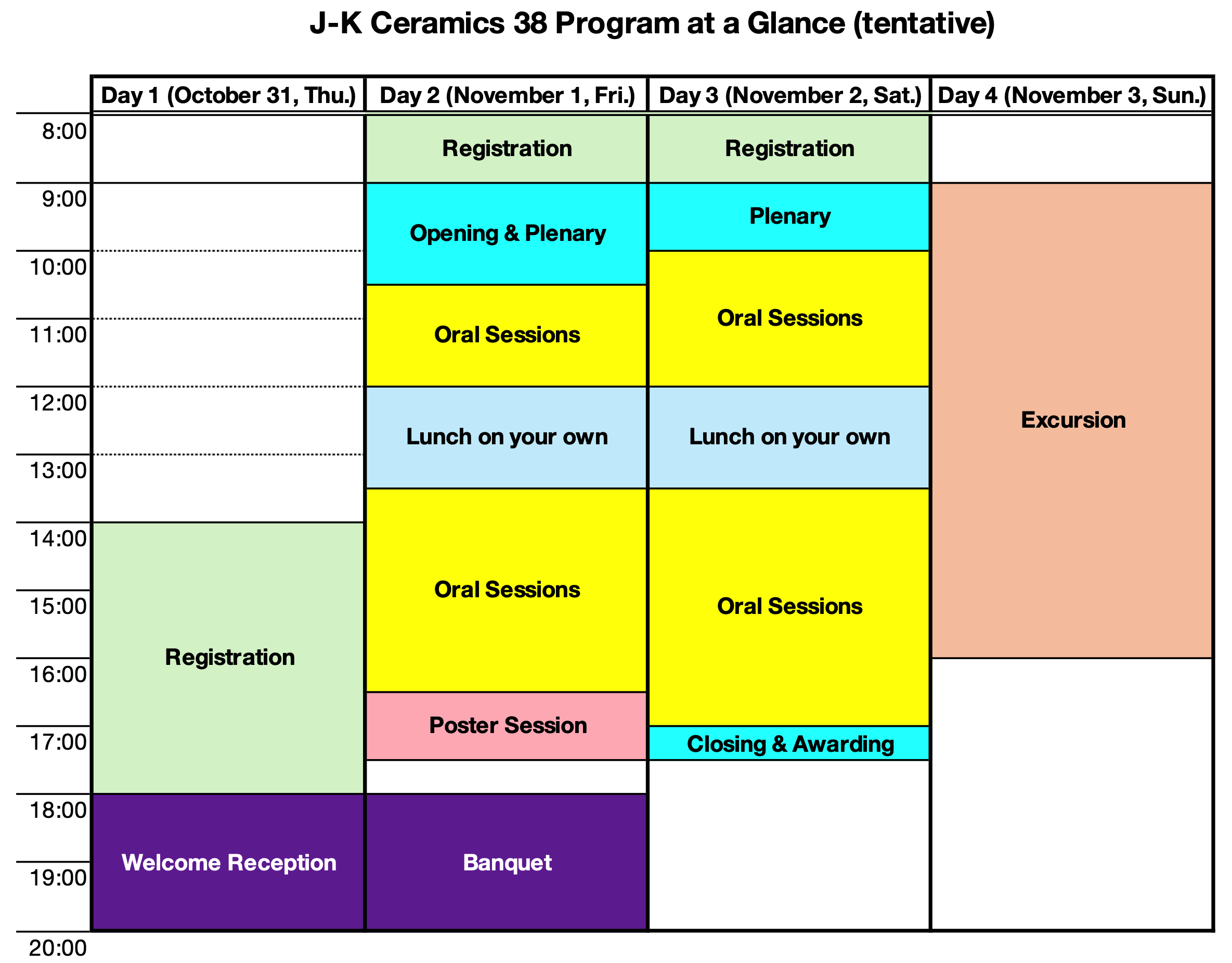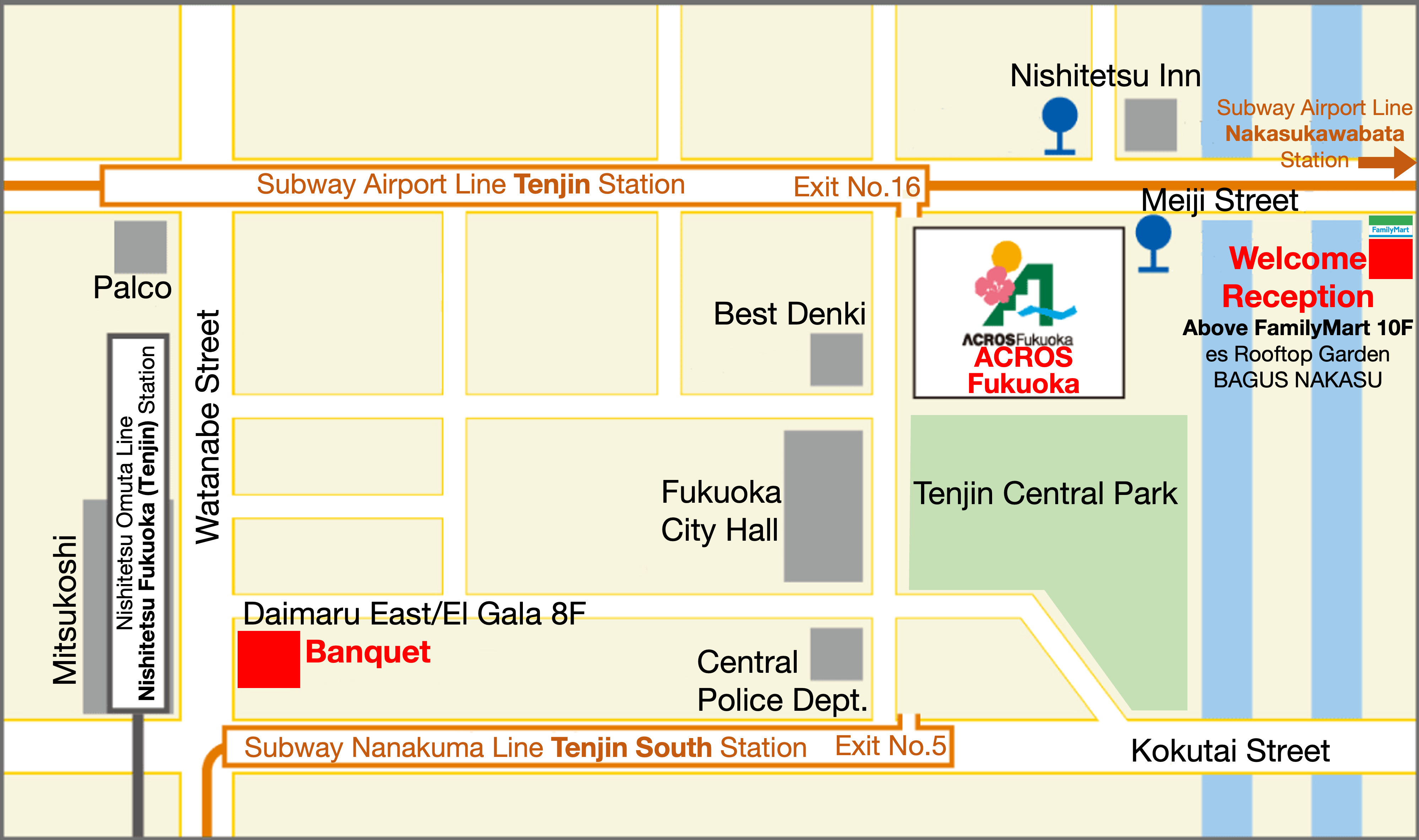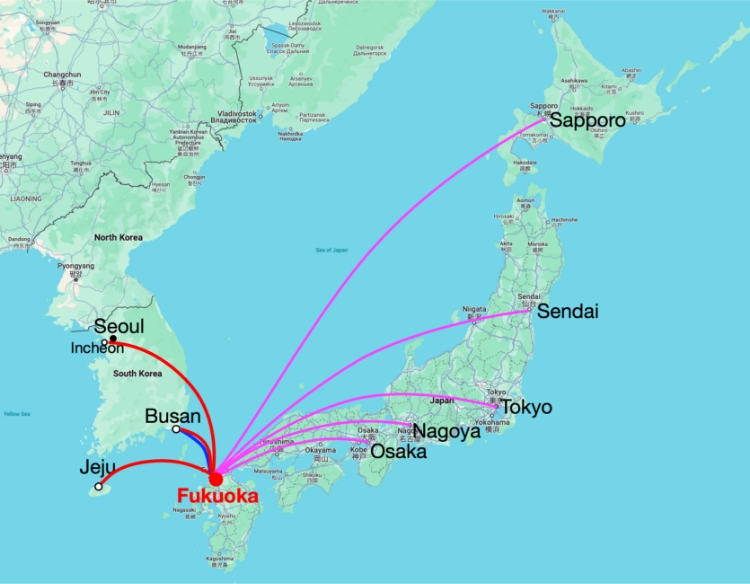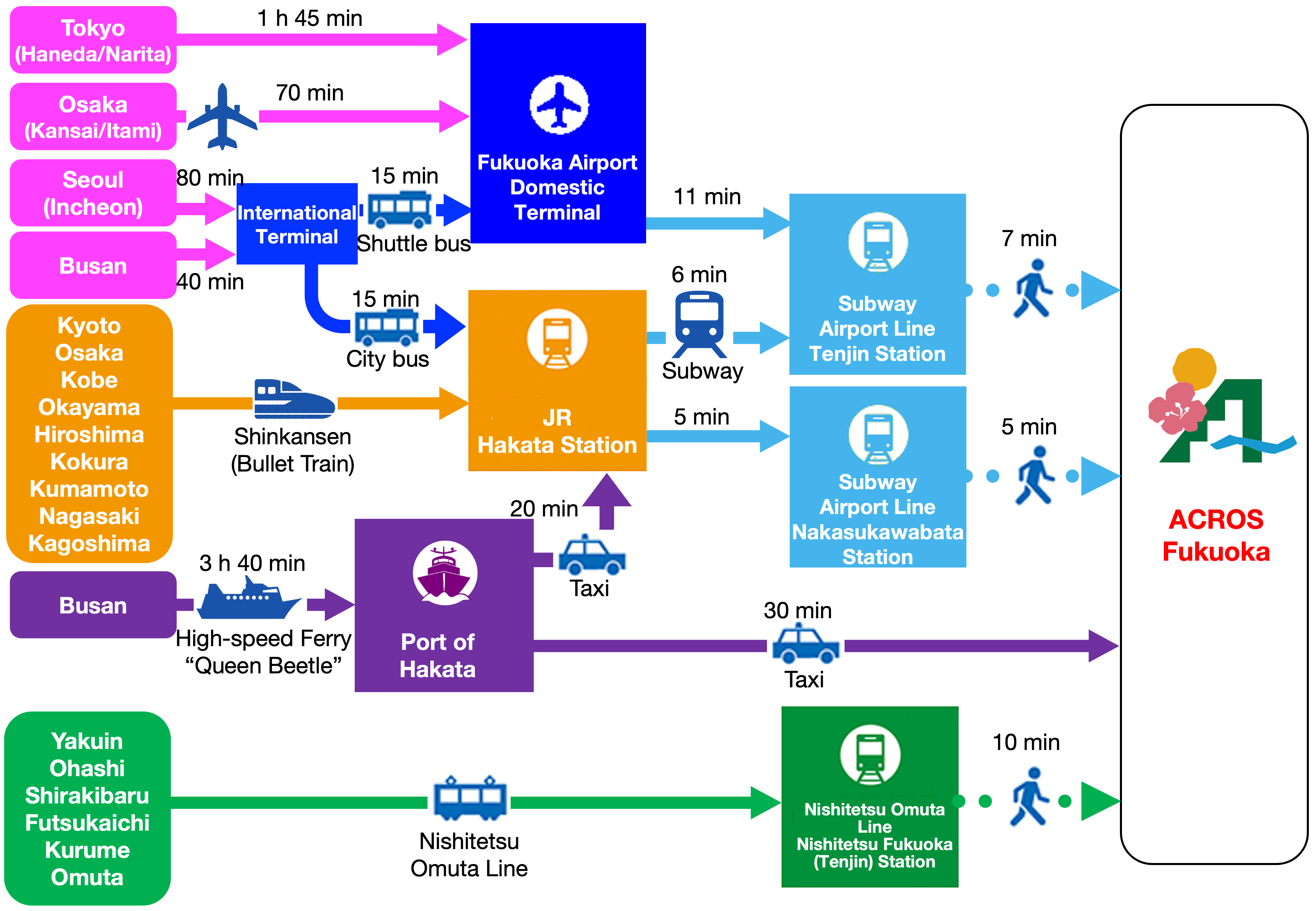News
2024/10/30
The latest electronic version of the Program Book has been officially released.
2024/10/24
Now you can download the detailed Program with time schedule from the "Program" tab.
2024/10/16
Cancellation Policies have been notified.
2024/10/10
Self-declaration of your eligibility for Young Best Oral/Poster Awards has been added on your My Page. Please edit your setting accordingly by Monday, October 14th.
2024/10/01
Now the Excursion includes your lunch with no additional payment!
2024/09/27
Early-bird Registration deadline has been extended to October 4th (Fri), 2024.
2024/09/20
Abstract submission deadline has been re-extended to September 30th (Mon), 2024.
2024/09/18
Details of the Excursion have been announced.
2024/09/07
Abstract submission deadline has been extended to September 20th (Fri), 2024.
2024/08/30
Program at a Glance and the social event information have been added.
2024/08/21
English descriptions have been largely improved.
2024/08/08
The errors in the payment system have been fixed.
2024/08/06
The conference official website is now open!!
Greetings
The Japan-Korea Seminar on Ceramics has been held annually since 1984 to promote academic, technological, and personal exchanges between Japan and Korea in the field of ceramics, a field that has a long history of bilateral relations. The first conference was held in Korea and the second in Japan, alternating between the two countries, and has been promoted through the cooperation of national research institutes, public research institutes, universities, and private-sector personnel from both countries. Since the 14th seminar in 1997, the name of the seminar has been changed to the "International Japan-Korea Seminar on Ceramics " to further promote its international development, and this year marks the 40th anniversary.
The 38th Seminar this year will be the first to be held in Japan in five years after the COVID-19 pandemic, and will be held in Fukuoka City, which is extremely convenient for both domestic and international transportation and is very popular among Asian countries Fortunately, Fukuoka City also has direct flights to and from Seoul and Pusan in South Korea, making it an excellent geographical location. Since we expect a large number of participants, including students from Korea, we will hold the conference at ACROS Fukuoka, a symbol of Tenjin, the center of Fukuoka City.
Please enjoy Fukuoka and Japan in autumn!
Prof. Hisao SUZUKI, Chair, the Organizing Committee of J-K Ceramics
Overview
Date:
October 31st – November 3rd, 2024
Venue:
ACROS Fukuoka, 1-1-1 Tenjin, Chuo-ku, Fukuoka 810-0001, Japan
Important Dates:
Early-bird registration open:
August 7 (Wed), 2024
Abstract submission deadline:
September 6 (Fri), 2024 September 20 (Fri), 2024 (extended)September 30th (Mon) (re-extended)
Abstract acceptance notification:
Mid-late September, 2024
Early-bird registration cutoff:
September 27 (Fri), 2024
Pre-registration cutoff:
October 25 (Fri), 2024
On-site registration:
October 31 - November 2, 2024
Program
| October 31st (Thu) | Registration, Welcome Reception |
|---|---|
| November 1st (Fri) | Registration, Opening Ceremony, Plenary Lectures, Oral Sessions, Poster Session, Banquet |
| November 2nd (Sat) | Registration, Plenary Lectures, Oral Sessions, Closing and Award Ceremony |
| November 3rd (Sun) | Excursion (details TBD) |

Social Events:
Welcome Reception *Included in the registration fees.
Date and time: 18:00~20:00, Thursday, October 31st, 2024
Place: es Rooftop Garden BAGUS NAKASU
Prato NAKASU 10F, 4-6-12 Nakasu, Hakata-ku, Fukuoka
(3 min walk from ACROS Fukuoka. See the venue map at Travel
Information.)
Phone: 092-263-7520
Banquet *Must be purchased separately.
Date and time: 18:00~20:00, Friday, November 1st, 2024
Place: TKP El Gala Hall
Daimaru East/El Gala (another entrance) 8F, 1-4-2 Tenjin, Chuo-ku,
Fukuoka
(7 min walk from ACROS Fukuoka, See the venue map at Travel
Information.)
Excursion *Must be purchased separately.
Date and time: 9:00~16:00, Sunday, November 3rd, 2024
A day trip to Yanagawa River Boat Cruise: Immerse yourself in the historic atmosphere of this Edo Period castle town.
A coach (bus) will take you to the historic City of Yanagawa, which is sometimes called the "Venice of Kyushu" for its hundreds of kilometers of canals built to provide irrigation to the city. Today, the canals serve as a peaceful and picturesque way to tour the city.
The fee includes: a round-trip coach transportation from/to Tenjin area; reserved river boat cruise; lunch after the boat cruise (at around 13:00 pm) in a traditional Japanese restaurant.
Capacity: max 50 (first-come first-served basis)
Details will be informed later to those who have booked the Excursion.
A link to Area Guide
Abstract Submission
Before submitting your abstracts, you must create a new account on this conference website. This account is also necessary to register you as a conference delegate and for your payment.
Abstract submission deadline: September 6 (Fri), 2024 September 20 (Fri), 2024 (extended)September 30th (Mon) (re-extended). This is the ultimate deadline and no more extension will be given.
How to submit: Your abstract should be submitted as a PDF file of 1 page, A4 portrait format. A Word template can be downloaded from here.
E-mail as well as postal submission will not be accepted.
The abstract acceptance will be notified by mid-late September.
Technical Session Topics and Session Chairs
A. Ceramics for Renewable and Sustainable Energy
Prof. Toshiyuki MASUI, Tottori University, Japan*
Prof. Shu YIN, Tohoku University, Japan
Prof. Nobuhito IMANAKA, Osaka University, Japan
Assist. Prof. Naoyoshi NUNOTANI, Osaka University, Japan
Prof. Hae Jin HWANG, Inha University, Korea*
Prof. Ho Won JANG, Seoul National University, Korea
Dr. Tae Ho SHIN, Korea Institute of Ceramic Engineering and Technology, Korea
A-1. Secondary Battery Materials and Related Technologies
: Lithium Ion Batteries and Supercapacitors
: New Approaches and Advances in Electrochemical Energy Materials
: Next-Generation Batteries
: Energy Storage Technology
: Solid Electrolyte Materials
: Emerging Technology for Energy Applications
: Interplay between Temperature and Battery Phenomena
A-2. Energy Materials and Related Technologies
: Fuel Cells and Biofuels
: Hydrogen Energy
: Solar Energy Materials
: Thermoelectrics, Piezoelectrics, and Triboelectrics
: Energy Harvesting Materials
: Energy Materials: Synthesis and Characterization
: Nuclear Energy
: Nano nergy
: Photocatalysis and Electrocatalysis
: Photovoltaics and Optoelectronics
B. Electroceramics and Applications
Prof. Naoki WAKIYA, Shizuoka University, Japan*
Prof. Tomoya OHNO, Kitami Institute of Technology, Japan
Assoc. Prof. Shintaro YASUI, Tokyo Institute of Technology, Japan
Prof. Katsuhisa TANAKA, Kyoto University, Japan
Prof. Kyu Hyoung LEE, Yonsei University, Korea*
Prof. Se-Yun KIM, Gyeongsang National University, Korea
Prof. Weon Ho SHIN, Kwangwoon University, Korea
B-1. Electronic, Magnetic, and Optical Materials
: Design, Synthesis, Structure, Characterization & Applications
: Luminescence Mechanisms and Energy Transfer
: Magnetism, Electromagnetism, and Spintronics
: Piezoelectric Materials and Device Technology
: Functional Materials: Synthesis and Characterization
: Application of Functional Materials
B-2. Sensor Materials & Semiconductors
: Sensor Materials
: Oxide Semiconductors
: Non-Oxide Semiconductors
: Power Semiconductors
C. Engineering Ceramics
Prof. Junichi TATAMI, Yokohama National University, Japan*
Dr. Tetsuo UCHIKOSHI, National Institute for Materials Science, Japan
Prof. Katsumi YOSHIDA, Tokyo Institute of Technology, Japan
Dr. Teiichi KIMURA, Japan Fine Ceramics Center, Japan
Dr. Yoon Suk OH, Korea Institute of Ceramic Engineering and Technology, Korea*
Dr. Young Jo PARK, Korea Institute of Materials Science, Korea
Prof. Dang Hyok YOON, Yeungnam University, Korea
C-1. Structural and Engineering Materials
: Innovative Solutions in Structural Design
: Numerical Methods and Algorithms
: Smart Materials and Structures
: Structural Analysis and Design
: Structural Failures
: Structural Stability, Safety, and Reliability
C-2. Materials Processing and Additive Manufacturing
: Materials Processing and Manufacturing
: Powder Processing
: Noble Materials Processing
: Additive Manufacturing and 3D Printing
D. Bio and Environmental Ceramics, Glass Science
Prof. Yoshiyuki SUGAWARA, Waseda University, Japan*
Prof. Chikara OHTSUKI, Nagoya University, Japan
Prof. Yasuhiko BENINO, Okayama University, Japan
Dr. Hui Suk YUN, Korea Institute of Materials Science, Korea*
Prof. Yong Gyu CHOI, Korea Aerospace University, Korea
Dr. Jin-Hyung LEE, Korea Institute of Ceramic Engineering and Technology, Korea
D-1. Bio and Environment Materials
: Orthopedic Biomaterials
: Drug Delivery Materials
: Nano-Biomaterials
: Smart Biomaterials
: Environment Materials
D-2. Glass Science
: Glass Structure and Computer Simulation
: Crystallization and Glass-Ceramics
: Mechanical and Thermal Properties of Glasses
: Optical Properties and Photonic Applications of Glasses
: Non-Oxide Glasses
E. Basic Science of Ceramics
Prof. Shinobu HASHIMOTO, Nagoya Institute of Technology, Japan*
Prof. Tohru SEKINO, Osaka University, Japan
Assoc. Prof. Tomoyo GOTO, Osaka University, Japan
Prof. Tadachika NAKAYAMA, Nagaoka University of Technology, Japan
Prof. Kyoung-Seok MOON, Gyeongsang National University, Korea*
Prof. Sang-Chae JEON, Changwon National University, Korea
Prof. Hak-Sung LEE, Dong-A University, Korea
E-1. Basic Science of Ceramics
: Sintering
: Diffusion
: Crystallography
: Instrumental Analyses
E-2. Cement, Traditional Ceramics, and Refractory Materials
: Cement Technology
: Pottery and Porcelain
: Traditional Ceramics and Ceramic Industries
: Refractory Materials and Industrial Applications
E-3. Virtual Engineering and Education
: Computer -Aided Engineering,
: Computational Chemistry and Simulation
: Big Data-Driven Materials Design and Process Modeling
: Materials Informatics
: Materials Education
F. Nanomaterials and Thin Films
Prof. Minoru OSADA, Nagoya University, Japan*
Dr. Kentaro SHINODA, National Institute of Advanced Industrial Science and Technology, Japan
Dr. Satoshi KITAOKA, Japan Fine Ceramics Center, Japan
Dr. Jun AKEDO, National Institute of Advanced Industrial Science and Technology, Japan
Prof. Hyun Suk KIM, Dongguk University, Korea*
Dr. Jong-young KIM, Korea Institute of Ceramic Engineering and Technology, Korea
Prof. Sang-Baek PARK, Chungnam National University, Korea
Prof. Ji-Won JUNG, Konkuk University, Korea
F-1. Nanomaterials and Nanotechnology
: Nanomaterials Synthesis
: Nano-Characterization Techniques
: Nanosurfaces and Interfaces
: Nano Pores/Shells
: Nano Tubes/Wires
: Functional Nanofibers
: Nano-Biosensors
: Nano-Carriers for Drug Delivery and Drug Targeting
: Applications of Nanomaterials
F-2. Thin Films and Coatings
: ALD, PLD, PVD, CVD, and Sputtering
: Solution-Based Deposition, Chemical Solution Deposition (CSD)
: Aerosol Deposition
: Plasma and Laser-Enhanced Coating Processes
: Advanced Thermal Spray Processing and EB-PVD
: Thermal/Environmental Barrier Coatings
: Advanced Coatings for Semiconductor Manufacturing Equipment and Device Fabrication
: Advanced Characterizations for Thin Films and Coatings
G. Special Symposium: Academy of Ceramic R&D Experts
Prof. Gye Seok AN, Kyonggi University, Korea*
Registration
Registration Fees:
| Early-bird Registration (〜 |
Regular 40,000 JPY, Student 20,000 JPY |
|---|---|
| Late Registration ( |
Regular 50,000 JPY, Student 25,000 JPY |
| On-site Registration (10/31〜) | Regular 60,000 JPY, Student 30,000 JPY |
| Accompanying Person | 15,000 JPY |
| Banquet | 10,000 JPY |
| Excursion(on-line advanced purchase only (~10/25)) | 5,000 JPY |
Only payment by credit cards and at convenience stores (within Japan only) will be accepted.
To register you to the conference, please first create your account.
Cancellation Policies
- All cancellations should be made by notifying the Secretariat by e-mail: info@jkceramics38.com
- Cancellations notified on or before October 18th, 2024, will receive a 100% refund.
- Cancellations notified on or before October 25th, 2024, will receive a 50% refund.
- No refund will be made for those notified on and after October 26th,2024.
Travel Information
Venue:
J-K Ceramics 38 will be held at ACROS Fukuoka located at Tenjin, the heart of Fukuoka City. It is just 11 minutes by subway from Fukuoka International Airport (Domestic Terminal) to Tenjin station, from which you can reach the venue in 5 minutes by walk.

Please refer to the website below for the access to ACROS Fukuoka.
https://www.acros.or.jp/english/access/
Travel to Fukuoka:
Kyushu Island is located in the southwest of Japan and has the longest cultural ties to mainland Asia. Fukuoka City is located in the north of Kyushu Island and the largest city in Kyushu with population of over 1.6 million. Fukuoka City is very conveniently connected to other major cities in Japan by trains, long-distance buses, and airlines. The entranceway to Fukuoka is, first of all, Fukuoka International Airport (FUK), which offers links to numerous cities in Japan, and 23 major cities overseas. Seoul is just 85 minutes away, and Shanghai can be reached in 100 minutes. Tokyo is a 90-minute flight, and Osaka 65 minutes. Furthermore, a big advantage of Fukuoka is that it takes only 10 minutes to reach the center of Fukuoka City from the airport using the subway system.

By land, visitors can reach Fukuoka by expressway or Japan Railways (usually written as JR) particularly Shinkansen, bullet trains you may say. Hakata Station located at the center of Fukuoka City is the main hub for Shinkansen and intercity express trains as well as local trains and subway. Hakata Port, which is very close to Fukuoka City downtown, welcomes 2 million travelers a year. This port serves as a terminal for the jet foil, which links Fukuoka to Pusan with a journey time of approximately 3 hours.
Transportation from Fukuoka Airport:
Fukuoka Airport is very conveniently located to come to the center of Fukuoka City (i.e. JR Hakata Station or Nishitetsu Tenjin Station) by subway or a taxi. Note that the international and domestic terminals are separated (on the other side across the runway), and the shuttle bus between these two terminals is available every 10–15 minutes free of charge. You can easily find the subway Fukuoka-kuko (Airport) Station right beneath the domestic terminal.
With the subway system, Hakata Station is the second from Fukuoka Airport and it takes only 5 minutes. Furthermore, Tenjin Station is the third station from Hakata Station and it takes another 6 minutes. Local and express (long-distance) buses are available from both Hakata and Tenjin stations.
From the international terminal to the central area of Fukuoka City, taking a taxi is a convenient and recommendable option, particularly when you have large luggage. Although the journey time depends on the traffic, it takes normally about 10–15 minutes, and the taxi fare is about 1,500–2,000 JPY.

Useful links:
Fukuoka City Official Tourist Guide
Accommodation:
There are plenty of hotels to choose from throughout the city, from economical business hotels near train and subway stations to mid- and high-end destination hotels in popular neighborhoods like Hakata and Tenjin. Hotels typically offer Western-style rooms (single, double, and twin) and facilities, and have Wi-Fi. Some may offer a choice between smoking and non-smoking rooms or also have hot springs or public bathing facilities in addition to in-room facilities.
Please note that the date of the Seminar overlaps with a weekend with holidays-in-a-row in Japan, November 1st (Fri.) – 4th (Mon.& national holiday). It is hence strongly recommended to book your hotel as early as possible; cancellation of hotel booking is usually very easy and free of charge until 3 – 7 days before your first night (depending on facilities).
The Seminar doesn’t offer hotel booking service. Please find and book your hotel via hotel booking websites such as Booking.com, Agoda, and Expedia.
Committee Members of the International Japan-Korea Seminar on Ceramics
Organizing Committee
JAPAN Side
Chair
Hisao SUZUKI, Shizuoka University, Professor Emeritus
Vice Chair
Nobuhito IMANAKA, Osaka University, Professor Emeritus
Committee Members
Hajime HANEDA, National Institute for Materials Science,
Dr. Tetsuo UCHIKOSHI, National Institute for Materials Science,
Masasuke TAKATA, Japan Fine Ceramics Center, Executive Director
Jun AKEDO, National Institute of Advanced Industrial Science and Technology,
Rintaro AOYAGI, National Institute of Advanced Industrial Science and Technology, Senior Researcher
Kentaro SHINODA, National Institute of Advanced Industrial Science and Technology,
Junji AKAI, Hokkaido University, Professor
Tomoya OHNO, Kitami Institute of Technology, Professor
Masato KAKIHANA, Tohoku University, Professor Emeritus
Shu YIN, Tohoku University, Professor
Tohru WAKIHARA, The University of Tokyo, Professor
Nobuhiro MATSUSHITA, Tokyo Institute of Technology, Professor
Shintaro YASUI, Tokyo Institute of Technology, Associate Professor
Takayoshi KATASE, Tokyo Institute of Technology, Associate Professor
Yoshiyuki SUGAWARA, Waseda University, Professor
Shinobu FUJIWARA, Keio University, Professor
Jun-ichi TATAMI, Yokohama National University, Professor
Takashi YAMAMOTO, National Defense Academy of Japan, Professor Emeritus
Naoki WAKIYA, Shizuoka University, Professor
Hiroyuki MUTO, Toyohashi University of Technology, Professor
Hiroshi ITAHARA, Toyota Central R&D Labs., Inc., Senior Researcher
Chikara OHTSUKI, Nagoya University, Professor
Shinobu HASHIMOTO, Nagoya Institute of Technology, Professor
Koichiro FUKUDA, Nagoya Institute of Technology, Professor
Hirotaka MAEDA, Nagoya Institute of Technology, Professor
Tadachika NAKAYAMA, Nagaoka University of Technology, Professor
Katsuhisa TANAKA, Kyoto University, Professor
Tohru SUGAHARA, Kyoto Institute of Technology, Professor
Tohru SEKINO, Osaka University, Professor
Tomoyo GOTO, Osaka University, Associate Professor
Naoyoshi NUNOTANI, Osaka University, Assistant Professor
Yoko SUYAMA, Research Institute for Inorganic Materials (RIIM), Director
Toshiyuki MASUI, Tottori University, Professor
Tokuro NAMBA, Okayama University, Professor
Yasuhiko BENINO, Okayama University, Associate Professor
Kei INUMARU, Hiroshima University, Professor
Michitaka OHTAKI, Kyushu University, Professor
Byung koog JANG, Kyushu University, Visiting Professor
Miki INADA, Kyushu University, Associate Professor
Yuki SHIROSAKI, Kyushu Institute of Technology, Associate Professor
Naotaka SAKAMOTO, Fukuoka Industrial Technology Center,
Yasushi IWAISAKO, Nippon Tungsten Co., Ltd., R&D Center, General Manager
Sachiko FURUTA, Saga Ceramics Research Laboratory, Director
Yuji NOGUCHI, Kumamoto University, Professor
Kai KAMADA, Nagasaki University, Associate Professor
Advisor
Tetsuya KAMEYAMA, National Institute of Advanced Industrial Science and Technology, Honorary Researcher
KOREA side
Chair
Byong Ho KIM, Korea University, Professor Emeritus
Vice Chair
Soon Gil YOON, Chungnam National University, Professor
Committee Members
Jong Oh BYUN, KCC Glass Corp., Vice President
Yong Soo CHO, Yonsei University, Professor
Woo Seok CHO, President of Korean Ceramic Society, KICET, Senior Researcher
Yong Ho CHOA, Hanyang University, Professor
Jo Woong HA, Inocera Co. President
Byung Dong HAHN, Korea Institute of Materials Science, Senior Researcher
Hae Jin HWANG, Inha University, Professor
Kyu Hong HWANG, Gyeongsang National University, Professor Emeritus
Won Bin IM, Hanyang University, Professor
Sun Q JEON, Korea Fine Ceramic Association, Chairman
Dae Yong JEONG, Inha University, Professor
Yeon Gil JUNG, Korea Institute of Ceramic Engineering & Technology, President
Byung Kook KIM, Korea Institute of Science and Technology, Senior Researcher
Do Kyung KIM, Korea Advanced Institute of Science and Technology, KAIST), Professor
Dong Wan KIM, Korea University, Professor
Eung Soo KIM, Kyonggi University, Professor
Hyoun Woo KIM, Hanyang University, Professor
Hyun Suk KIM, dongguk University, Professor
Hyung Tae KIM, The Federation of Korea Ceramic Associations, Executive Director
Jeong Joo KIM, Kyungpook National University, Professor Emeritus
Kwang Ho KIM, Pusan National University, Distinguished Professor
Myong Ho KIM, Changwon National University, Professor Emeritus
Suk Young KIM, Youngnam University, Professor Emeritus
Do Kyun KWON, Korea Aerospace University, Professor
Hee Soo LEE, Pusan National University, Professor
Hyun Kwon LEE, Kumho National Institute of Technology, Professor
Jong Ho LEE, Korea Institute of Science and Technology, Senior Researcher
Joon Hyung LEE, Kyungpook National University, Professor
Kee Sung LEE, Kookmin University, Professor
Kyu Hyoung LEE, Yonsei University, Professor
Chul Jin CHOI, Korea Institute of Materials Science, President
Sang Jin LEE, Mokpo National University, Professor
Sung Min LEE, Korea Institute of Ceramic Engineering and Technology, Vice President
Sahn NAHM, Korea University, Professor
Hee Jung PARK, Dankook University, Professor
Hyung Ho PARK, Yonsei University, Professor
Sang Yeup PARK, Gangneung-Wonju National University, Professor
Young Jo PARK, Korea Institute of Materials Science, Senior Researcher
Jae Chul PYUN, Yonsei University, Professor
Sung Soo Ryu, Korea Institute of Ceramic Engineering and Technology, Senior Researcher
Pung Keun SONG, Pusan National University, Professor
Sang Im YOO, Seoul National University, Professor
Dang Hyok YOON, Yeungnam University, Professor
Hui Suk YUN, Korea Institute of Materials Science, Senior Researcher
Advisors
Jun Young LEE, The Federation of Korea Ceramic Associations, Chairman
Soon Ja PARK, Seoul National University, Professor Emeritus
Steering Committee of the 38th International Japan-Korea Seminar on Ceramics
Chair
Michitaka OHTAKI, Kyushu University, Professor
Committee Members
Kengo SHIMANOE, Kyushu University, Professor
Hisahiro EINAGA, Kyushu University, Professor
Shigeru FUJINO, Kyushu University, Professor
Koichiro SUEKUNI, Kyushu University, Associate Professor
Ken WATANABE, Kyushu University, Associate Professor
Hajime HOJO, Kyushu University, Associate Professor
Koichi SUEMATSU, Kyushu University, Associate Professor
Atsushi INOISHI, Kyushu University, Associate Professor
Byung koog JANG, Kyushu University, Visiting Professor
Tatsumi ISHIHARA, Kyushu University, Professor
Hiroshige MATSUMOTO, Kyushu University, Professor
Katsuro HAYASHI, Kyushu University, Professor
Hirofumi AKAMATSU, Kyushu University, Associate Professor
Miki INADA, Kyushu University, Associate Professor
Kosuke WATANABE, Kyushu University, Associate Professor
Yoichi SHIMIZU, Kyushu Institute of Technology, Professor
Toshiki MIYAZAKI, Kyushu Institute of Technology, Professor
Kazushige UEDA, Kyushu Institute of Technology, Professor
Yuki SHIROSAKI, Kyushu Institute of Technology, Associate Professor
Satoko TAKASE, Kyushu Institute of Technology, Assistant Professor
Naotaka SAKAMOTO, Fukuoka Industrial Technology Center, Team Leader
Masayoshi YUASA, Kinki University, Professor
Hirotaka FUJIMORI, Yamaguchi University, Associate Professor
Masato MACHIDA, Kumamoto University, Professor
Motohide MATSUDA, Kumamoto University, Professor
Shintaro IDA, Kumamoto University, Professor
Takeshi HASHISHIN, Kumamoto University, Associate Professor
Hitoshi INOKAWA, Sojo University, Associate Professor
Mitsunori YADA, Saga University, Professor
Hiroshi YAMADA, National Institute of Advanced Industrial Science and Technology, Senior Researcher
Morito AKIYAMA, National Institute of Advanced Industrial Science and Technology, Senior Researcher
Masato UEHARA, National Institute of Advanced Industrial Science and Technology, Senior Researcher
Kai KAMADA, Nagasaki University, Associate Professor
Yuji OKUYAMA, Miyazaki University, Professor
Soichiro SAMEJIMA, Kagoshima University, Associate Professor
Kenichi SODEYAMA, Kagoshima Industrial Technology Center, Senior Researcher
Contact
Interdisciplinary Graduate School of Engineering Sciences, Kyushu University
6-1 Kasugakouen, Kasuga, Fukuoka 816-8580, JAPAN
E-mail: info@jkceramics38.com
Phone: +81-(0)92-583-7947

